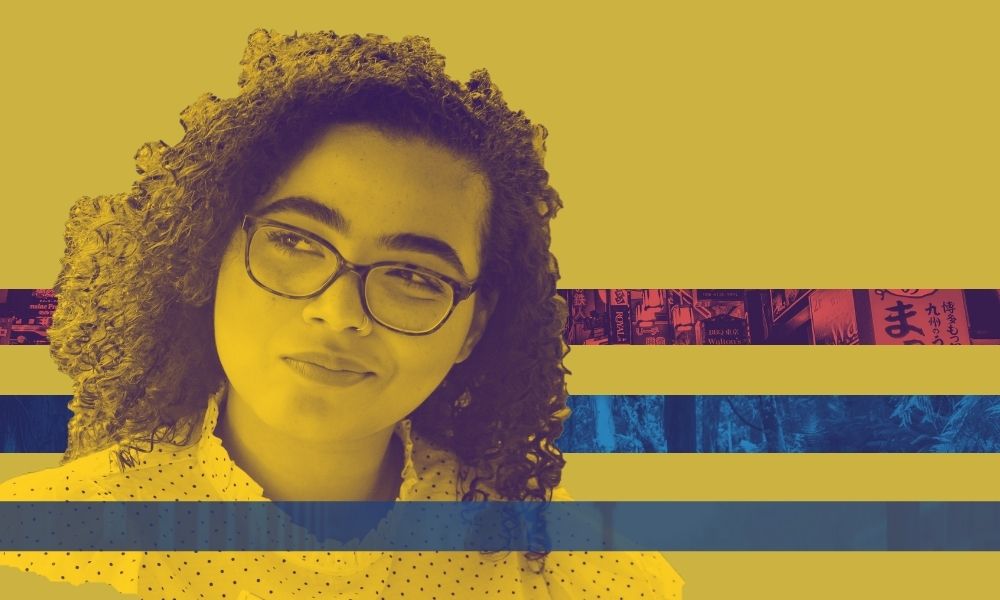
In this post, Andrea Levy, a graduate of the Master of Public Health Programme, Sharon Levy the CPD lead for the Data Driven Innovation programme at the Usher Institute and Neneh Rowa-Dewar who co-directs the MPH (online) explain the value of Student-Led, Individually-Created Courses (SLICCs) as a profound opportunity for personal and professional growth…
Throughout my first two years of the Master of Public Health programme, I often waivered back forth between doing a dissertation and signing up for the SLICC in third year. The University of Edinburgh’s Student-Led, Individually-Created Courses (SLICCs) offer undergraduate and graduate students an opportunity to develop their own curriculum based on their professional and academic interests and self-identified learning needs. In addition to expanding their knowledge in the chosen field of study, the experiential nature of SLICCs contribute to students’ development of professional autonomy, mastery of self-leadership skills, and ultimately to increased employability. For graduate students in particular, many of whom may already have some professional work experience, the SLICC offers a unique learning experience focusing on continuing professional development.
Once my plans to establish a new Non-Governmental Organisation (NGO) with some friends and colleagues started to take shape back in 2019, I realised that applying my knowledge, skills and experience in Disaster Response and Global Health would be the easy part. The bigger challenge, however, would be the learning involved in starting a charitable organisation, and not just starting one, but also taking on a leadership role within this new venture. I soon realised that the SLICC would be a great opportunity for me to align my NGO journey with what a SLICC had to offer.
One of the most valuable aspects of the SLICC was the opportunity for co-creation with my mentors – first Neneh, then Sharon. They were not there to “teach” me things, as they considered me to be the “expert” in the field in which I was working. I was 100% responsible for my learning objectives. Rather, they were there to guide, offer support and advice, and most importantly, ask me the hard questions that allowed me to progress steadily through both the SLICC and the establishment of the NGO. Neneh patiently talked me through fleeting panic around blogging (“Neneh, I’m old, I don’t even know what a blog is!!”). Sharon began our very first conversation with “Why should I fund this NGO of yours.” After a moment of confusion, thinking he had just offered to fund our project, and not knowing how to answer his question, I recovered myself, realising he was channelling Dragon’s Den, and proceeded to answer with what (I think!) was able to capture my passion for and commitment to my work.
About mid-way through my SLICC, further personal and professional challenges came in the form of major changes in my midwifery practice, and, of course, the COVID pandemic. As a senior practice partner and the Head Midwife at my hospital, these events called on me to develop leadership skills and a degree of self-awareness beyond what I had already mastered over 15 years in my profession. Working on the SLICC in parallel to these profound changes – informally in daily personal reflection, semi-formally in my blog submissions, and formally in the Final Reflective Report – helped me to navigate what has been the most challenging period of my career, but also the time during which I feel I have experienced the most personal and professional growth.
My NGO, Inspiral Health (inspiralhealth.org), was registered as a Community Interest Company in June 2020, and I have taken on the role of Director of Programmes. Completing the SLICC, with my mentors both challenging and supporting me in equal measure, has enabled me to flourish and grow as a leader within Inspiral Health, throughout the COVID pandemic at my hospital, and through major structural changes within my midwifery practice.
 Andrea Levy
Andrea Levy
Andrea Levy, MPH, BHSc, is the Head Midwife at North York General Hospital in Toronto, Canada, and the Director of Programmes for Inspiral Health.
Why? This was the initial question I asked Andrea when I first met her on Zoom. As I joined her SLICC journey halfway through the academic year, I read her blogs and could see the general ‘direction of travel’ and understand the articulated vision… but why?
I had mentored others on SLICCs and realised that ‘passion’, ‘desire’, and ‘conviction’ propel students along their self-directed learning pathway. Being a senior professional with a fantastic (dare I say, fanciful) ambition, as an outcome for her project, I asked Andrea to pitch her NGO to me. “Picture yourself standing in the ‘Dragons’ Den’ and tell me why I need to give you my money to make your dream into a reality”, I said. And she did. A bit hesitantly at first, saying she did not expect that at our first meeting, but with passion and conviction.
As an educator, I invest my time and energy in creating, engaging and delivering ‘learning opportunities’. In return I reap the joy and satisfaction from seeing ‘my’ learners grow as people and as professionals. With a SLICC the investment should be, by design, very limited as it is the student who needs to drive their project and chart their progress guided by constructivism and experiential learning theory. Yet, I asked Andrea to be more creative and use the blog platform to showcase the art, as well as the science that grounds Public Health interventions.
Graduates of the Master of Public Health, in a post pandemic era, must have attributes to help them negotiate a world in flux, where rapid changes affect how we relate to one another, the way we work, and even what it means to be a professional. As educators we should help them to hone their ‘curiosity for learning’ and ‘passion to engage locally and globally’, which was exactly what Andrea was set to do.
Supporting passionate learners who are themselves knowledgeable professionals is an affirming experience. It anchors the assertion that power in the classroom, or in healthcare settings, must be power ‘to’, rather than power ‘over’. Enabling and supporting learners to achieve their goal in their own way – even if it may not be how they have envisaged it – is an experience in co-creation.

Sharon Levy
After completing his nurse training, Sharon continued to develop his professional practice in a variety of community based care environments. His first clinical informatics post, in 1997, was a launching pad to a national leadership role at the Royal College of Nursing (RCN) as the UK informatics adviser – a post he held until 2007. After a short career break abroad, Sharon re-joined the NHS as a Telehealth Nurse Specialist, a post he held until 2012. Sharon joined Edinburgh University, Nursing Studies, to lead and direct a number of MSc programmes before moving to the Usher institute where he is currently a CPD lead for the Data Driven Innovation programme. His main research interests and activities focus on digital health and he actively supports research and development efforts by Spina Bifida Hydrocephalus Scotland.
The co-creative role we play when mentoring a SLICC project is in many ways similar to that of a qualitative researcher. Rather than directing and expecting a particular narrative from participants, qualitative researchers try to create a supportive space in the way they respond to their participant, guide them through the topic, and remain wide open and encouraging to the participant to steer the interview in new and unpredictable directions. Often the best and most meaningful data is co-created this way by researcher and participant and the same is true for SLICC projects co-created by students who lead the way and mentors who support, question and gently challenge their students.
Like a qualitative researcher, as a SLICC mentor I do not impose my own view or knowledge of a particular topic on my SLICC student. Indeed, I knew very little, and certainly much less than Andrea, about starting an NGO, so was never tempted or able to ‘teach’ in a traditional sense. Instead, I followed the start of her journey with great interest, while encouraging, gently questioning and even challenging Andrea at times to forge ahead with her ambitious plan. She looked to me for direction at the start but quickly settled in to the autonomous nature of the SLICC. Like a qualitative researcher keeps an eye on the topic but remains open to a change in direction, I bore in mind the SLIICC learning outcomes set by Andrea when responding to her plans and writing.
The emphasis on reflection in the SLICC provides a flexible framework allowing for changes in direction and capitalising on bumps in the road by viewing them as opportunities for learning. Should Andrea not have succeeded (yet) in developing her NGO, the process she went through to try would still have allowed for growth by encouraging reflection on why learning outcomes were not yet met and what can be done differently in the future. As her mentors, Sharon and I aim to encourage a growth mind-set by providing a soft place to fall, where learning from mistakes and wrong turns is valued, even celebrated. This approach appears to co-create and open up supportive spaces where students like Andrea flourish and do more and better than she expected at the start. It was a great privilege to be a small part of the process.
Either as an experienced professional straying from the comfort zone of a well-established career, or as someone who is at the very beginning of their journey in Public Health, the SLICC is highly recommended as a rich and satisfying opportunity for co-creation, experiential learning, and profound personal and professional growth.
 Neneh Rowa-Dewar
Neneh Rowa-Dewar
Dr Neneh Rowa-Dewar co-directs the MPH (online) and is the DMGPHS Director of Quality.
Further Information
- Support material for Student-Led, Individually-Created Courses (SLICCs).
- Information for staff interested in SLICCs.

